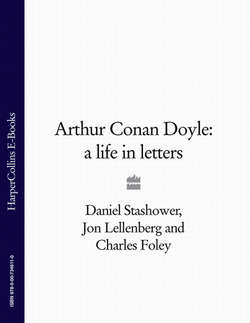Читать книгу Arthur Conan Doyle: A Life in Letters - Daniel Stashower, Исмаил Шихлы - Страница 62
to Mary Doyle STONYHURST, JUNE 1873
ОглавлениеI am glad to hear that my report was a good one. I have got my prize now for certain, and it will be a much more honourable one than any other that I have got yet, as Syntax is one of the hardest schools in the house, and certainly not more than eight in the class will get a prize. I am trying to improve in my French and I have read a great many books in that language lately. I will tell you a few of them to see if you have ever seen them. ‘Vingt milles lieus ses les mers’ by Jules Verne, ‘Don Quixote’ ‘cingt semaines dans un balon’ by Jules Verne, ‘Napoleon et le grande armeé’ ‘Voyage dans soudain’ ‘La Roche des Mouettes’ ‘Voyage d’un Enfant a Paris’ ‘Le Fratricide’ ‘Les Russes et les anglais’ ‘Enfants du Capitaine Grant’ ‘a la lune et de retour’ and a lot more, and I am getting to relish them quite as well as English books.
Our master, Mr Splaine, has been up at the Tichbourne Trial, he was appointed as librarian to bring up some old charts of the college. he has now returned and told us all his adventures with great gusto.
I hope you are all well at home, has little Frank got any teeth yet? I suppose he won’t be able to walk by the time I come home.
Like Scott’s novels, Jules Verne’s visionary work would take root in Conan Doyle’s mind, and Verne’s Twenty Thousand Leagues Under the Sea can be readily felt in Conan Doyle’s 1929 science-fiction novel, The Maracot Deep, in which undersea explorers travel to a kingdom on the ocean floor.
The Tichborne Claimant, one of England’s most famous legal cases, fascinated Stonyhurst, for it dealt with a mysterious figure who claimed to be the long-missing Sir Roger Tichborne, a Stonyhurst graduate and heir to a fortune, who had been presumed lost at sea in 1854. For twelve years Lady Tichborne refused to believe that her son was dead, and she kept a light in the entrance of Tichborne Hall to enable him to find his way home in the dark. In 1866 she received a letter from a butcher in Wagga Wagga, Australia, a man known locally there as Arthur Orton, who declared—amid apologies for his lax correspondence—that he was her long lost son.
When he arrived in England Lady Tichborne welcomed him, but other members of the family denounced him as an impostor, and his claim turned into the longest and most convoluted proceeding in British legal history. It was finally dismissed in 1871, and now, in 1873, Orton was on trial for perjury. Conan Doyle followed avidly ‘a case of identity’ (to cite the title of an early Sherlock Holmes story) that seemed lifted from the pages of Alexandre Dumas—ending in Orton’s eventual conviction and ten years in prison. The trial was still underway when the 1872-73 school year came to an end.*
